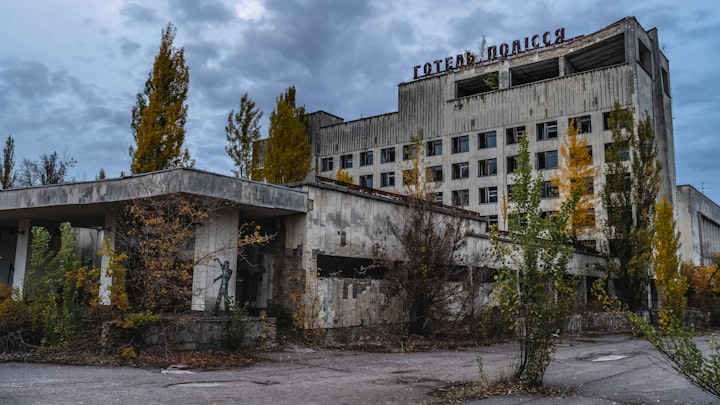Content warning
This story may contain sensitive material or discuss topics that some readers may find distressing. Reader discretion is advised. The views and opinions expressed in this story are those of the author and do not necessarily reflect the official policy or position of Vocal.
The Secrets of North Korea Revealed: Deciphering the Enigmas of the Isolated Nation.
Examining Enigmas from the Ryugyong Hotel to the Health of Kim Jong-un.

North Korea, commonly known as the "Hermit Kingdom," has been veiled in secrecy, mystery, and enigma for a considerable period. The country, under the governance of the Kim dynasty, has transformed into one of the most reclusive and autocratic regimes globally. This article aims to explore some of the most confounding enigmas and occurrences associated with North Korea, elucidating the intricacies of this enigmatic nation.
The "Hotel of Doom"
The Ryugyong Hotel, situated in Pyongyang, the capital of North Korea, is a prominent and distinctive landmark. Often referred to as the "Hotel of Doom," this colossal, pyramid-shaped edifice stands at an impressive height of 1,080 feet and boasts an astonishing 105 floors. What adds to its intrigue is the fact that, despite its grandeur, it has never accommodated a single guest.
The hotel's inception can be traced back to the Cold War rivalry between North and South Korea. In 1986, a South Korean company erected the Westin Stamford Hotel in Singapore, which, at the time, was the world's tallest hotel. In response, North Korea embarked on a plan to surpass their southern counterparts by constructing an even taller hotel, the Ryugyong.
The construction of the Ryugyong Hotel was initiated in 1987 with the ambitious objective of being operational by the 80th birthday of President Kim Il-sung in 1992. However, the project encountered numerous challenges, including engineering difficulties and economic crises following the collapse of the Soviet Union. As a result, the construction was suspended, leaving behind an enormous, unfinished concrete edifice that would become a lasting emblem of North Korea's struggles.
Over time, the building acquired monikers such as the "Hotel of Doom" and the "Phantom Hotel." Speculations circulated that the hotel was inadequately constructed, with misaligned elevator shafts and structural imperfections. The North Korean government even expunged any mention of the hotel from official photographs and maps
In 2008, following a 16-year hiatus, construction unexpectedly recommenced as part of an agreement with an Egyptian conglomerate tasked with constructing North Korea's 3G network. The hotel's exterior underwent modernization with metal panels and windows, and it was utilized as a significant propaganda tool, showcasing political slogans and a historical narrative of North Korea on its facade. Despite these endeavors, the hotel's interior remained largely incomplete, and international hotel chains, such as Kempinski, ultimately withdrew their plans to manage the property. To this day, the purpose and future of the Ryugyong Hotel remain shrouded in mystery. In a nation renowned for its secrecy, this towering edifice serves as a symbol of both ambition and enigma..
The Mysterious "Double Death" of Kim Il-sung
The Korean Demilitarized Zone (DMZ), which serves as a buffer zone between North and South Korea, has been a source of tension and psychological warfare for a considerable period. From 1953 to 2004, both sides utilized massive loudspeakers to broadcast audio propaganda across the DMZ, exchanging messages with each other. However, a peculiar incident occurred in 1986 when South Korean newspapers reported rumors from Japan regarding the demise of North Korean leader Kim Il-sung. Although rumors about North Korean leaders were not unprecedented, the subsequent events were far from ordinary.
On the day subsequent to the rumors, the citizens of South Korea were subjected to melancholic music emanating from North Korean loudspeakers, followed by recitations of Kim Il-sung's biography and messages extolling him as the "great leader." Later that day, North Korea officially declared that Kim Il-sung had been assassinated and had passed away. His son, Kim Jong-il, was promptly appointed as the president and marshal.
The situation escalated when North Korean loudspeakers derided South Korea, stating, "The world has a good view of South Korea," causing panic and confusion among South Korean authorities. The cabinet convened an emergency meeting, and even the United States provided conflicting information.
The situation became even more perplexing when, just a day later, North Korea abruptly ceased the broadcasts regarding Kim Il-sung's demise, without providing any explanation. Kim Il-sung reappeared as if nothing had occurred. This enigmatic episode raised numerous questions, including whether it was an error, a misreporting, a personal initiative by someone within the propaganda apparatus, or a failed coup attempt.
Nearly 35 years later, the true nature of the events in 1986 remains ambiguous. The incident highlights the inscrutability of North Korea and its inclination for secrecy, even concerning the well-being of its leadership.
North Korean Ghost Ships
For a number of years, a phenomenon has been observed whereby boats have been found washed up on the western shores of Japan, frequently devoid of occupants or containing the remains of men. These enigmatic vessels, which are often rudimentary in design and lack contemporary engines or navigational equipment, have become known as "North Korean ghost ships."
The origin and purpose of these boats have confounded observers. Some have posited that they are North Korean fishing vessels in search of valuable marine life, such as king crab, squid, and sandfish. These fishing boats are frequently adorned with insignia indicating their affiliation with North Korea's military, which plays a significant role in the country's fishing industry.
The mystery surrounding these boats deepened in 2017 when several North Korean vessels washed ashore with their crews still alive. These fishermen claimed to hail from North Korea and, surprisingly, expressed a desire to return home, despite the risks and hardships they faced.
The query that arises is why these fishermen, who are cognizant of the oppressive North Korean regime, would undertake such significant risks and, upon being rescued, express a desire to return to their homeland. One explanation may be attributed to the increasingly stringent international sanctions imposed on North Korea due to its nuclear and missile tests. As the pressure on the regime intensifies, there may be greater demands on fishermen to augment agriculture and food supplies. This, coupled with restricted access to fishing areas due to territorial disputes and China's acquisition of North Korean fishing rights, could be compelling fishermen to venture further into perilous waters.
Another hypothesis posits that some of these fishermen may be conducting espionage missions under the guise of fishing expeditions. However, the true motivations and circumstances behind these "ghost ships" remain a mystery, underscoring the challenges of obtaining reliable information from North Korea.
The Abduction of Megumi Yokota
One of the most poignant enigmas concerning North Korea pertains to the abduction of Megumi Yokota, a 13-year-old Japanese girl, in 1977. Megumi disappeared while returning home from her badminton practice in Niigata, Japan, instigating a frenzied search by her family and the authorities. For almost two decades, the Yokota family endured excruciating uncertainty regarding Megumi's destiny. Subsequently, in 1993, a North Korean defector divulged startling particulars about the abduction. As per the defector, North Korean agents had abducted Megumi, apprehensive that she might have recognized them during a mission in Japan. They transported her to North Korea, where she was subjected to a life of captivity.
Regrettably, Megumi's narrative is not an isolated occurrence. North Korea eventually confessed to abducting 13 Japanese citizens, exposing a dark and sinister facet of its operations. Nevertheless, the destiny of these abductees remains a mystery, with inquiries regarding their welfare and the circumstances surrounding their abductions.
One intriguing element of Megumi's case is the unforeseen reunion with her family. In 1997, North Korea declared that Megumi was still alive and residing in the country. This disclosure prompted her family to make her story public, resulting in inquiries in the Japanese parliament and attracting international attention. In a surprising turn of events, Megumi's parents were permitted to meet their granddaughter, Megumi's daughter, in Mongolia in 2014.
Notwithstanding the aforementioned advancements, the destiny of Megumi Yokota remains uncertain, and her elderly mother and siblings persist in their aspiration for her repatriation. The instance of Megumi Yokota and the other Japanese nationals who were abducted serves as a poignant reminder of the human calamities that are linked with the clandestine administration of North Korea.
Speculation About Kim Jong-un's Health
In the year 2020, the global community was consumed by conjecture and contradictory accounts pertaining to the state of health of Kim Jong-un, the current leader of North Korea. Speculations began to circulate that Kim was severely unwell, potentially due to a botched medical procedure, with some even alleging that he was in a coma or had suffered brain death. The origin of these reports was Daily NK, a South Korean website renowned for its monitoring of news and rumors emanating from North Korea. The website reported that Kim Jong-un was convalescing from heart surgery, necessitated by health complications arising from factors such as excessive smoking, obesity, and fatigue. Adding to the intrigue, Kim had not been sighted in public since April 11th, thereby raising concerns about his overall well-being
The alleged health crisis of Kim Jong-un has rapidly disseminated worldwide, prompting international news outlets and intelligence agencies to closely monitor the situation. There has been speculation regarding the potential successor to Kim as the leader of North Korea, with his sister, Kim Yo-jong, emerging as a prominent candidate.
However, just as the world was grappling with these uncertainties, Kim Jong-un reappeared in a photograph published by North Korean state media. In the photo, he was seen cutting the ribbon at a new fertilizer factory outside Pyongyang, appearing very much alive. This sudden reappearance in the public eye has led many to question the accuracy of the initial reports about his health.
Nevertheless, this episode has underscored the challenges of obtaining reliable information about North Korea and its leadership. Some have even speculated that Kim Jong-un may utilize body doubles, further adding to the enigma surrounding his regime.
North Korea remains a land shrouded in mystery, where the culture of the regime is deeply rooted in secrecy and propaganda. The "Hotel of Doom," the peculiar circumstances surrounding Kim Il-sung's purported death, the enigmatic North Korean ghost ships, the tragic abduction of Megumi Yokota, and the conjectures surrounding Kim Jong-un's health all serve to highlight the intricacies and uncertainties surrounding this reclusive nation. As the international community endeavors to comprehend and engage with North Korea, it confronts a formidable challenge in distinguishing fact from fiction within a country renowned for its clandestine operations and propaganda. The enigmas of North Korea serve as a poignant reminder of the persistent enigma that this nation represents on the global stage.
About the Creator
Enjoyed the story? Support the Creator.
Subscribe for free to receive all their stories in your feed. You could also pledge your support or give them a one-off tip, letting them know you appreciate their work.





Comments (1)
Very interesting! ❤️💚💛🩶🤍🩷💜🩵💙🖤🧡♥️🤎💕